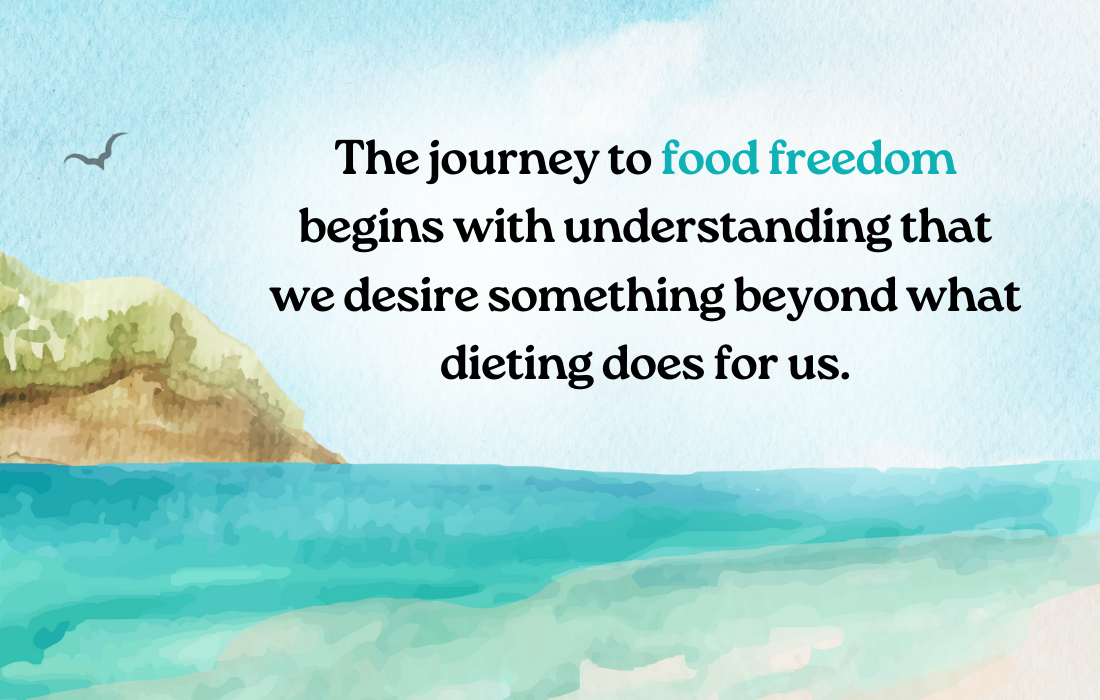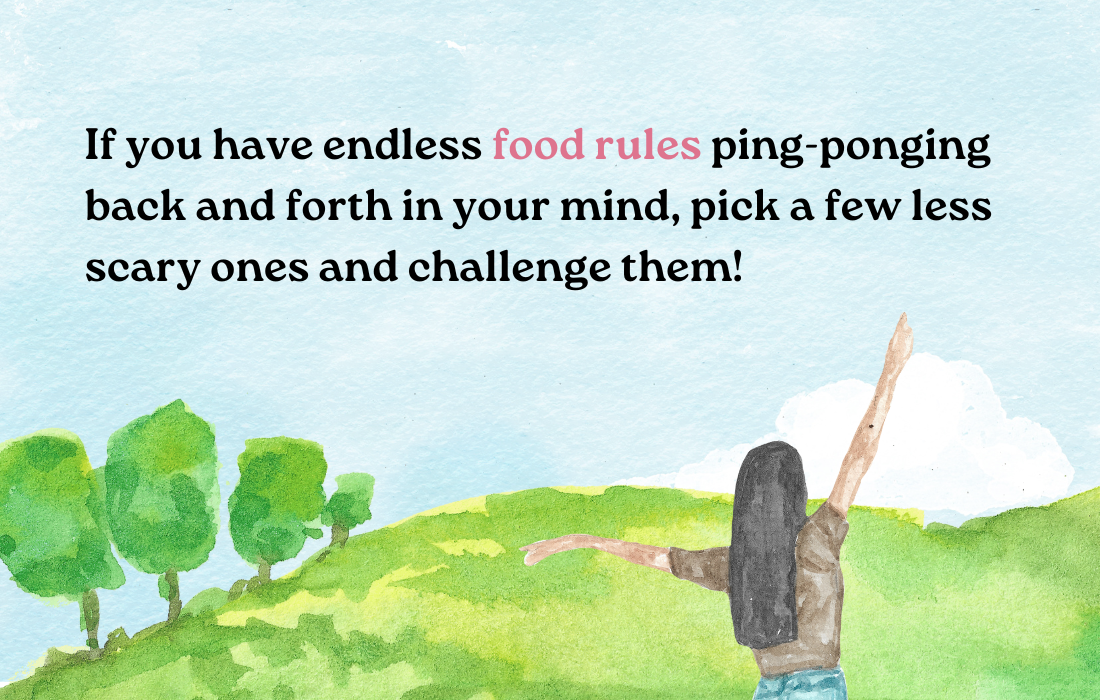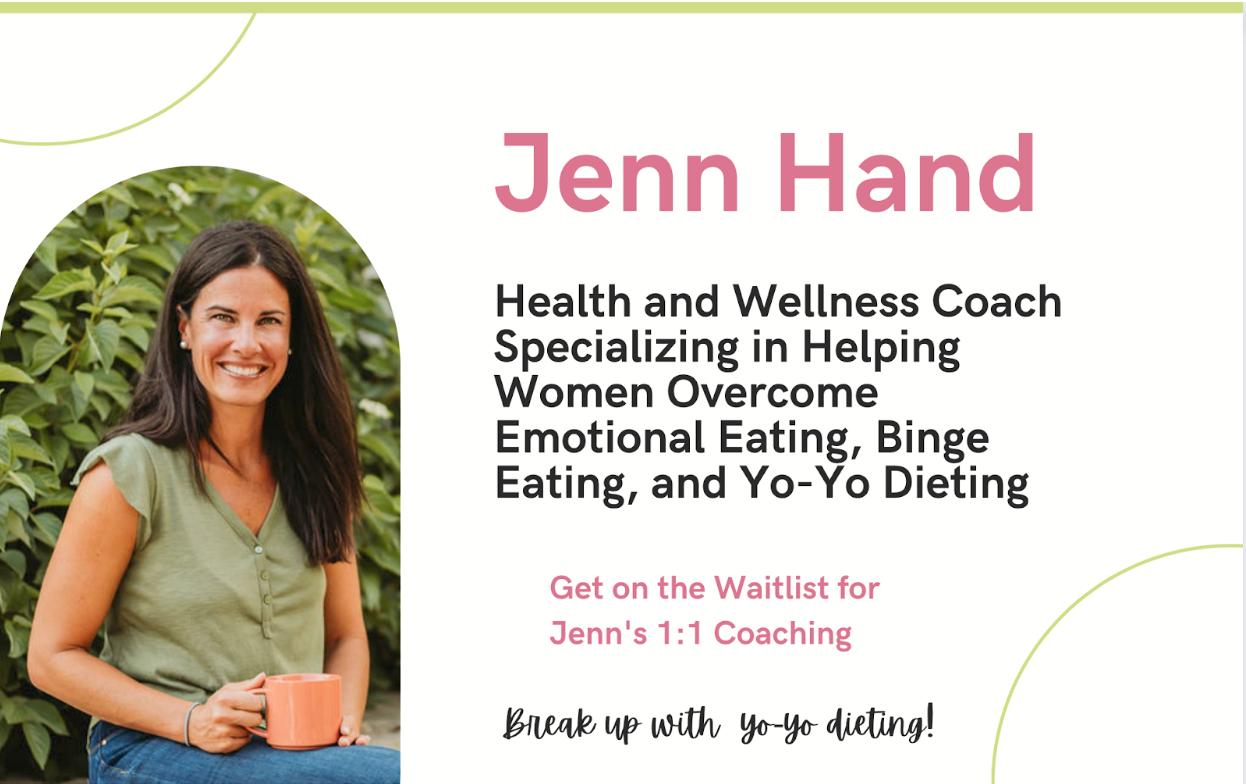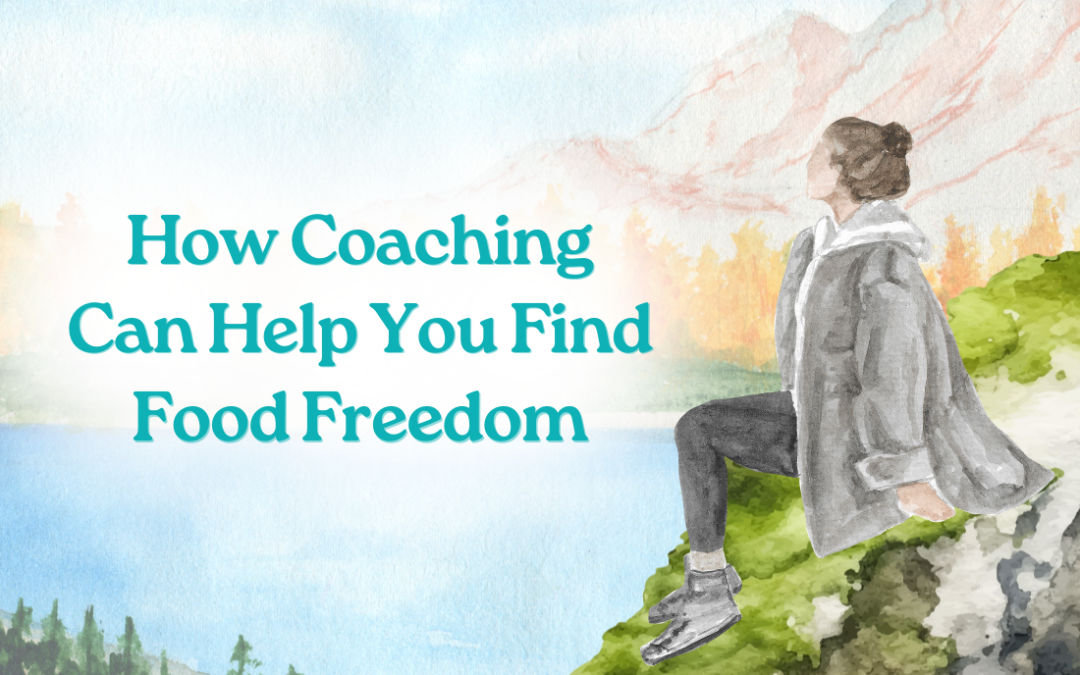Food Relationship Coaching Can Help You Have a Healthier Connection with Food and Eating
What is a food relationship coach and how do they help? I’ll cover that and more in this post about how to have a healthier relationship with food and eating.
Written by Jenn Hand, Emotional Eating Coach, Holistic Nutritionist, Board Certified Health Coach, NBC-HWC
For over a ⅓ of my life, I wasn’t sure if I’d ever have a “normal” relationship with food.
I had been trapped in the diet and binge cycle for so long, it WAS my normal. Now, I’m a binge and emotional eating coach and holistic nutritionist. I know that finding food freedom is possible because I’ve done it! So, If you’re wondering about food relationship coaching and whether it works, then you’ve come to the right place.
In this post I’m going to cover how coaching can help you improve your relationship with food. And I’ll share my own story of becoming a normal eater and finding freedom around food.
Table of Contents
- My Food Relationship Story
- Common Questions About Working with a Food Relationship Coach
- How to Have a “Normal” Relationship with Food
- My Top 7 Steps to Food Freedom
- Common Questions about Food Freedom
My Food Relationship Story
For years I wasn’t sure if I could ever have a “normal” relationship with food.
While I had spent countless years starting diets, then falling off, then swearing I’d have more willpower the next time (cue cycle on repeat) I desperately wanted a healthy relationship to food.
The key to my own “success” and feeling like I was one of those normal eaters was learning how to have a relationship with food.
Unfortunately, unlike alcohol or drugs, we can’t swear off food forever! So in order to feel sane around it, we must learn how to have a relationship to it.
For those who’ve struggled with binge eating, overeating, emotional eating and chronic yo-yo dieting, learning to heal your relationship to food IS possible! Through deep healing on a physical, mental, emotional and spiritual level, you can learn to feel healthy and sane around food.
So much of what we pick up in the diet world is learned behavior.
Unlearning these thoughts and habits is a big part of this journey.
We let go of what no longer serves us to then find what does serve us. This unlearning allows us to reconnect to the wisdom inside of us that’s been there all along: the “normal” eater part of us.
When you work with an emotional eating food coach, you can find your way back to food freedom and finally stop the binge-restrict cycle.
Common Questions About Working with a Food Relationship Coach
What is a food coach?
A food coach is someone who helps you dive deeply into your patterns, habits, thoughts and relationship to food.
Since it’s a general term, I look at food coaching as very holistic rather than just specifically working on what and how much you eat.
How can I address specific dietary concerns or restrictions with a food coach?
This is an important part of the journey for many people and one to bring up at the beginning of your work together.
Food freedom is possible no matter if you have dietary concerns or restrictions, so don’t let that derail your progress!
Can you provide guidance on portion control and mindful eating?
Absolutely! A part of looking at portion control is reframing it to “how much does my body need.”
We work on how to listen to those cues and how to slow down enough to learn when to stop.
How do you support clients in overcoming emotional eating?
Overcoming emotional eating is my favorite topic!
I teach women how to feel without eating, help them learn what emotions send them to food, and how to move through to process or express feelings. I call it “learning the art of dealing with life rather than turning to food!”
What is your approach to helping clients with food addiction or eating disorders?
For those with more serious concerns like addiction or an eating disorder, I recommend getting specialized help.
I can be a support alongside other specialists, but those concerns are best addressed with someone specializing in addictions.
How do your coaching methods help individuals break free from dieting and binge eating?
I take a four pronged approach: physical, mental, emotional and spiritual.
I work with clients on everything from food journaling to overcoming emotions to body trust and self-love to filling the void without food. My clients learn to let go of bingeing as they no longer need it. I guide women to learn how to listen to and trust themselves, so they don’t need another book, program or diet in the future!
How can I find the balance between my health goals and enjoying food?
To me it’s just that: a balance.
I am a big believer that however we eat, it must be sustainable. We can’t cut out everything forever, so we need to learn what types of foods we can handle (and when) in order to derive pleasure from food while also working towards our goals.
What resources or tools do you offer to support clients on their journey?
I offer zoom sessions, email support, and access to all of my resources, lessons, challenges and digital materials to help them move forward to find food freedom.

How to Have a “Normal” Relationship with Food
The Journey to Food Freedom
The journey to food freedom begins with understanding that we desire something beyond what dieting does for us.
Dieting never gives us what we deeply want: sanity and peace. So our journey to freedom starts the day we realize that while we may be tempted to diet, we know deep down that dieting isn’t going to give us that deep sense of peace long term.
This realization and knowing will keep us going through this journey–it’s our deep “why” and inspiration for staying the course if it gets challenging.
How a Healthy Body Image Connects with Food Freedom
When we feel at ease in our body, we feel at ease with how we show up in the world. Body image and food freedom go hand in hand.
Many people often work on the food piece first, but no matter which angle you come at it from, both positively impact the other.
How Body Image Issues Can Keep You Stuck in the Dieting World
One of our biggest stumbling blocks can be our poor body image.
When we hate what we see in the mirror, we can get stuck in a mind battle that then sends us to the food. I used to eat to make the critical voices in my head go away.
By learning to have some kindness and compassion for ourselves, it can help to quieten down the food battle in our head. (It can even be helpful to avoid the mirror, while you are learning how to be in your body and have a relationship to yourself and food!)
Why Unlearning the Dieting Mindset Is Important
So much of this journey is unlearning!
The diet mindset is restrictive and punishing. It’s filled with guilt, anxiety, willpower, and angst. We rarely learn how to listen to our body’s wisdom when we’re constantly filled with rules, should’s, and good/bad foods.
It’s important to begin to soften this mindset–to learn to find the middle ground and let go of the black or white thinking. Life isn’t black or white and neither is food! Learning to soften the rules, the should’s, and letting go of the guilt will help restore some balance around food.
How to Make “Good” Food Choices (Most of the Time)
Instead of thinking in terms of “good” food choices, I like to think of it in terms of nourishment and balance.
When we are good or bad, it feels like a tightrope. We are either on or off. When we learn how to make choices that are balancing, nourishing and fueling our body in a loving way, it gives us the space to understand what our body needs, how much and when. We can still eat nutritious foods, it just comes from a place of love rather than punishment.
Holistic Weight Loss Program vs. Dieting
One of the things missing in every diet program is addressing the mental and emotional aspects of food.
So much of having a healthy relationship to food comes from our mindset and from how to deal with our emotions, so if we aren’t addressing both of these, we’ll never have change that lasts.
My view of weight loss is holistic–it takes into account the physical, mental, emotional and spiritual parts of who you are and how they relate to food. THIS is what helps you change from the inside out, and change for good.

My Top 7 Steps to Food Freedom
#1 Acknowledge and Reflect
In our fast-paced society, reflection isn’t always valued.
But one of the things I’ve seen in my own journey and that of my clients is slowing down to learn from lessons, habits, emotions and obstacles along the way.
Unlike the diet world, you can’t “fail” on this path–all of what happens here is feedback to learn lessons and course correct to move forward.
#2 Seek Support
There’s no shame in needing support on this path.
I convinced myself for many years that food was simple and I could manage on my own. The reality is, food is complex and many of us can’t do it on our own.
We’re not robots and food isn’t a formula to follow. Seeking a coach, therapist, program or group is a wonderful way to help you untangle the messy parts of this journey to gain clarity and find progress faster.
#3 Embrace Intuitive Eating
Learning to listen to your body is key!
As we begin to let go of food rules, the diet mindset, and find a rhythm to our eating, we tune in deeper to what our body needs and wants. The misnomer of Intuitive Eating is to “just eat what you want, when you want.”
Over the years, I’ve found that most women need some structure on this path and it’s beneficial to use both the mind and the body together! We don’t discount nutrition knowledge, and we don’t blindly eat over any craving we have. We learn how to integrate both through trial and error and learning what works for our own body.
#4 Let Go of Food Rules
I am a big advocate of challenging what goes on in our minds.
If you have endless food rules ping-ponging back and forth in your mind, pick a few less scary ones and challenge them!
Can’t have dessert because it’s a Wednesday? Enjoy one small piece of chocolate and savor it. Think you shouldn’t have pasta because you’ll gain weight? Make one dinner this week with pasta to prove yourself wrong. So much of letting go of food rules is breaking one and trusting that you are okay without it!
#5 Simplify Healthy Eating
Here is what I teach all of my clients: add protein every time you eat.
At snacks and meals, add in eggs, lean meats, chicken, turkey, beans, legumes, tofu, tempe, nuts or seeds. This helps regulate blood sugar, keep you more even throughout the day and establishes a rhythm of normalcy in how you fuel your body.
From there, you can begin to tweak, refine and learn about what combos of food you like, how much you need, and how different foods affect your body. Keeping it simple helps to keep you on track!
#6 Cultivate Body Trust and Freedom
I like to think of trust and freedom as part of a triangle.
The only way to trust is to experience it yourself (by breaking a food rule, by journaling instead of eating, by expressing how you feel, by stopping when you are full, or any other way you build trust with yourself), which builds trust and expands freedom.
Each one impacts the other, so continue to expand your comfort zone so you keep building that sense of trust with yourself.
#7 Stay Committed to Your Intention
This journey is usually the path less traveled.
The anti-dieting movement has definitely taken hold over the last few years, but it’s still very normal to go on a diet. When I would get tempted to diet and quit this path, I’d ask myself what the alternative would be. I knew I didn’t want to be an older woman and look back on a life that was spent dieting, so I stayed the course.
Deep down, I knew there was another way to live. Dig deep to get clear on your “why” and what your inspiration is– use it to fall back on when the journey gets hard.

Common Questions about Food Freedom:
Is it possible to lose weight without dieting?
Yes. Also dieting is never sustainable long term.
You may lose weight, but it’s almost impossible to keep it off long term with a diet. Approaching weight from a holistic way to address not only the physical, but mental, emotional and spiritual aspects of your body and food helps to uncover what’s blocking sustainable weight loss.
What can I do to have a healthy relationship with food?
One of my favorite ways to feel more peaceful around food is to challenge and break food rules.
We often don’t realize how much time and energy is spent on should’s and supposed-to’s. Rules can make us feel “crazy” around food because we get way too in our heads around what to eat. Continue to challenge what you picked up in the diet world to prove to yourself you CAN break those rules
What are some causes of weight gain?
Weight gain can be caused by many things–eating too much for your frame, a sedentary lifestyle, a lack of sleep, high levels of stress, hormonal imbalances, genetics, and other lifestyle related habits.
What are some healthy habits that are easy to incorporate into my busy life?
Two of my favorite healthy habits are meal prepping and walking. Meal prep can be a lifesaver during busy weeks at work or in life.
Start with something manageable–2-3 dinners a week and build from there. I typically only meal prep dinners but do what works for you! Walking is also a great habit to incorporate into your day–try to block off time at lunch or before/after dinner to begin to build the habit!
How Coaching Works: My Process
A HUGE WIN
“I finally feel like one of those people who doesn’t obsess over food all the time. Sure, I have my moments (don’t we all), but it’s not the focus like it once was in my life. I am becoming a ‘normal’ eater. I eat when I’m hungry, and I eat what I want.
Sometimes that means junk food or too much sugar or super healthy greens smoothies, but I don’t judge myself based on it. And I don’t obsess over it. I move on with my life. I’ve been able to uncouple my food choices = my worth as a person. This is what I was hoping for, and it feels like a HUGE win.”
-Meredith H., Canada
Want to halt a binge in its tracks?
Grab the FREE Guide: 4 Simple Ways to Stop a Binge!
Related Articles:
⚪ How to Stop Binge Eating Forever
⚪ How a Binge Eating Coach Can Help You to Stop Overeating and Feel Free Again
⚪ Emotional Eating Coach: Overcome Emotional and Binge Eating
Get the Normal Eater’s Newsletter
Join 8000+ women who are overcoming overeating, binge eating, and breaking up with dieting forever. Get Jenn’s inspiring and actionable weekly newsletter with the latest posts, podcasts, and tips on how to love your body, find food freedom, and lose weight holistically.
Get the Normal Eater’s Newsletter
Work with an Emotional Eating & Holistic Nutrition Coach
Overcome Bingeing and Emotional Eating, and Break Up with Yo-yo Dieting
Working with an emotional eating coach and holistic nutritionist can help you get free from the frustrating binge and restrict cycle and stop yo-yo dieting.
You don’t have to be obsessed with food or have a million rules around eating to find your natural weight and learn to love your body. Ready to actually see a lasting change and experience true freedom?
Schedule a 20-min CallAbout the Author:

Jenn Hand has been helping women like you become normal eaters since 2015.
She’s worked with thousands of women, helping them to balance their bodies, end bingeing, stop obsessing over food, and start feeling amazing again. As a board-certified health coach and holistic nutritionist, Jenn knows how to support you in making real positive changes that last.
Her articles have been published on Mind Body Green, Tiny Buddha, Thrive Global and other local and global media platforms. She’s the author of How to Be a Normal Eater and the creator of The Normal Eater’s Club program. Listen to Jenn’s advice and tips on the Cake Doesn’t Count Podcast, or read more of her articles for free on the Food Freedom Blog.
I FEEL AT PEACE WITH MY FOOD CHOICES
Before I signed up for coaching with you, I spent most of my days thinking about food.
I was a chronic dieter and literally spent 30 years of my life trying everything under the sun to “fix” my food issues. It wasn’t until I met you and did this work that anything REALLY changed.
It wasn’t easy and yes–I WAS skeptical–but I wake up every day LIVING instead of being a shell of myself. I can now show my two daughters how to have a healthy relationship with food and my body and I can’t thank you enough. Because of you, I feel at peace with my food choices and 100x more comfortable in myself.
-Ann, USA





